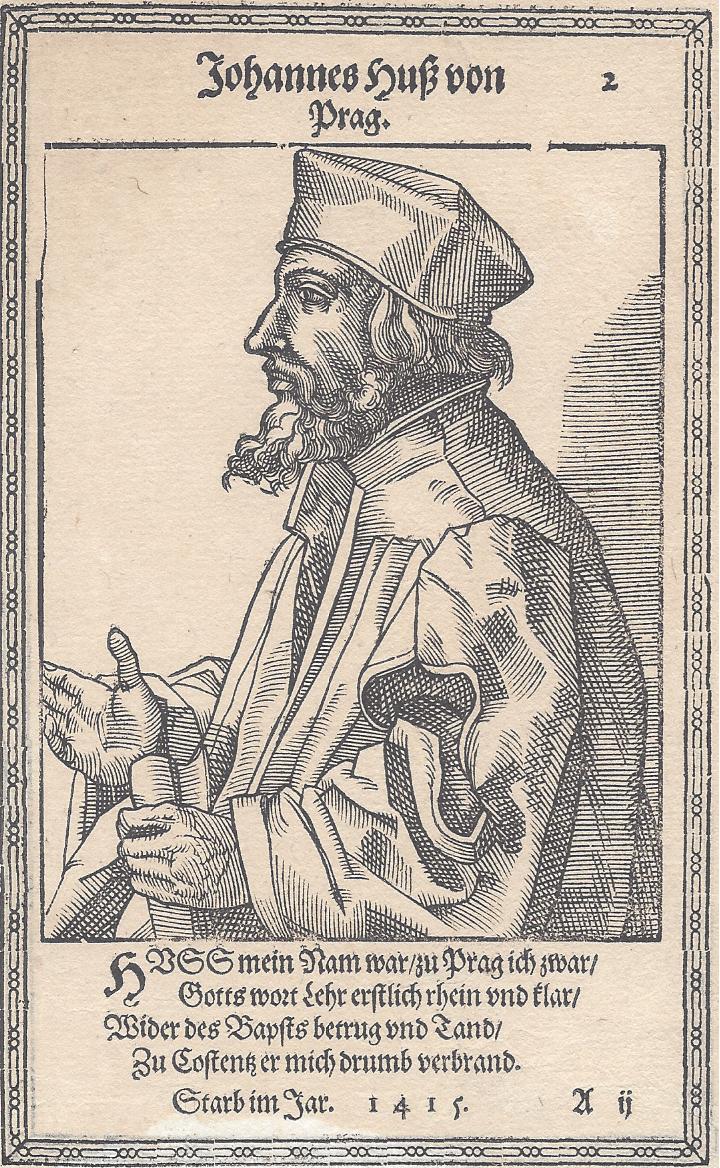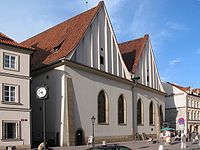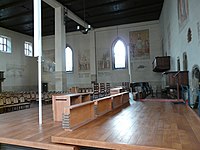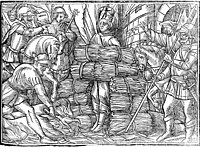
Jan Hus
Jan Hus (/hʊs/; Czech: [ˈjan ˈɦus] ; c. 1370 – 6 July 1415), sometimes anglicized as John Hus or John Huss, and referred to in historical texts as Iohannes Hus or Johannes Huss, was a Czech theologian and philosopher who became a Church reformer and the inspiration of Hussitism, a key predecessor to Protestantism, and a seminal figure in the Bohemian Reformation. Hus is considered to be the first Church reformer, even though some designate the theorist John Wycliffe.[a][2][3][4][5] His teachings had a strong influence, most immediately in the approval of a reformed Bohemian religious denomination and, over a century later, on Martin Luther.
For the films, see Jan Hus (1954 film), Jan Hus (2015 film), and John Hus (1977 film).
Jan Hus
c. 1372
6 July 1415 (aged 42–43)
John Hus, John Huss
After being ordained as a Catholic priest, Hus began to preach in Prague. He opposed many aspects of the Catholic Church in Bohemia, such as its views on ecclesiology, simony, the Eucharist, and other theological topics. Hus was a master, dean and rector at the Charles University in Prague between 1409 and 1410.
Alexander V issued a Papal bull that excommunicated Hus; however, it was not enforced, and Hus continued to preach. Hus then spoke out against Alexander V's successor, Antipope John XXIII, for his selling of indulgences. Hus's excommunication was then enforced, and he spent the next two years living in exile.
When the Council of Constance assembled, Hus was asked to be there and present his views on the dissension within the Church. When he arrived, with a promise of safe-conduct,[6] he was arrested and put in prison. He was eventually taken in front of the council and asked to recant his views. He refused. On 6 July 1415, he was burned at the stake for heresy against the teachings of the Catholic Church.
After Hus was executed, the followers of his religious teachings (known as Hussites) refused to elect another Catholic monarch and defeated five consecutive papal crusades between 1420 and 1431 in what became known as the Hussite Wars. Both the Bohemian and the Moravian populations remained majority Hussite until the 1620s, when a Protestant defeat in the Battle of the White Mountain resulted in the Lands of the Bohemian Crown coming under Habsburg dominion for the next 300 years and being subject to immediate and forced conversion in an intense campaign of return to Catholicism.
Early life[edit]
The exact date of Hus's birth is disputed. Some claim he was born around 1369,[7] while others claim he was born between 1373 and 1375.[8] Though older sources state the latter,[9] more contemporary research states that 1372 is more likely.[10] The belief that he was born on 6 July, also his death day, has no factual basis.[8] Hus was born in Husinec, southern Bohemia, to peasant parents.[11] It is well known that Hus took his name from the village where he lived (Husinec). The reason behind him taking his name from his village rather than from his father is up to speculation; some believe that it was because Hus did not know of his father, while others say it was simply a custom at that time.[12] The name "Hus," however, means "goose" in Bohemian (now called Czech), and he was a century later referenced as a "Bohemian goose" in a dream given to Frederick, the Elector of Saxony. Nearly all other information known about Hus's very early life is unsubstantiated.[13] Similarly, we know little of Hus's family. His father's name was Michael; his mother's name is unknown. It is known that Hus had a brother due to him expressing concerns for his nephew while awaiting execution at Constance. Whether or not Hus had any other family is unknown.[14]
At the age of roughly 10, Hus was sent away to a monastery. The exact reason is not known; some claim that his father had died,[15] others say he went there due to his devotion to God.[16] He impressed the teachers with his studies, and they recommended him to move to Prague, one of the largest cities in Bohemia at that time. Hus apparently supported himself by securing employment in Prague, which allowed him to fulfill his basic necessities, and access to the Prague Library.[17]
Three years later, he was admitted to the University of Prague.[18] Though not an exceptional student, he pursued his studies with ferocity.[19] In 1393, Hus earned a Bachelor of Arts degree at the University of Prague, and he earned his master's degree in 1396.[20] The strongly anti-papal views that were held by many of the professors there likely influenced Hus's future works.[21] During his studies, he served as a choir boy, to supplement his earnings.[22]
Aftermath[edit]
Bohemian Protest[edit]
As news of Hus's death spread outrage was brewing from the local nobles and doctors.[50] On 2 September 1415, a document now called the Bohemian Protest was signed with corresponding attached wax seals by 100 notable people from Bohemia and Moravia in protest of Jan Hus's burning. There is evidence that four documents of this kind were made in total, however only this one is known to survive and is currently held at the University of Edinburgh.[51] The statement inside reads that "Master John Hus was a good, just and catholic man" that "consistently detested all error and heresies" and that anyone that believed that heresy was arising within Bohemia or Moravia to be "the worst of traitors".[50]









